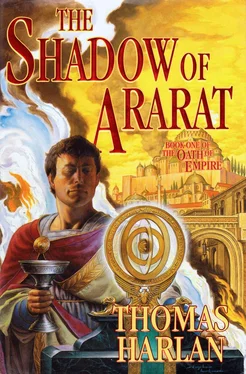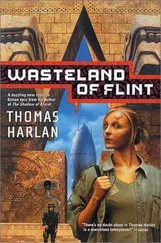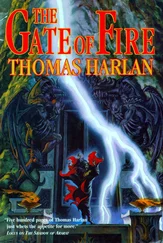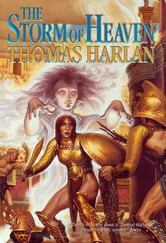Thomas Harlan - The shadow of Ararat
Здесь есть возможность читать онлайн «Thomas Harlan - The shadow of Ararat» весь текст электронной книги совершенно бесплатно (целиком полную версию без сокращений). В некоторых случаях можно слушать аудио, скачать через торрент в формате fb2 и присутствует краткое содержание. Жанр: Фэнтези, на английском языке. Описание произведения, (предисловие) а так же отзывы посетителей доступны на портале библиотеки ЛибКат.
- Название:The shadow of Ararat
- Автор:
- Жанр:
- Год:неизвестен
- ISBN:нет данных
- Рейтинг книги:3 / 5. Голосов: 1
-
Избранное:Добавить в избранное
- Отзывы:
-
Ваша оценка:
- 60
- 1
- 2
- 3
- 4
- 5
The shadow of Ararat: краткое содержание, описание и аннотация
Предлагаем к чтению аннотацию, описание, краткое содержание или предисловие (зависит от того, что написал сам автор книги «The shadow of Ararat»). Если вы не нашли необходимую информацию о книге — напишите в комментариях, мы постараемся отыскать её.
The shadow of Ararat — читать онлайн бесплатно полную книгу (весь текст) целиком
Ниже представлен текст книги, разбитый по страницам. Система сохранения места последней прочитанной страницы, позволяет с удобством читать онлайн бесплатно книгу «The shadow of Ararat», без необходимости каждый раз заново искать на чём Вы остановились. Поставьте закладку, и сможете в любой момент перейти на страницу, на которой закончили чтение.
Интервал:
Закладка:
"This is easy land," he replied, his hand light on the reins of the chestnut mare he favored. "In the south, beyond the An'Nafud, the land is harsher. There my people live, on the edges of the great sand. There it takes skill to survive."
It was a long way from the fertile valley of the Father of Rivers. Ahmet had shaken his head and urged his camel onward. Night fell and they were still far from the nearest rest house. Mohammed led the caravan into a low saddle between two hills where the rise of the land offered a little shelter and had them make camp.
Ahmet sat down next to the merchant, folding his legs under him.
"What do you believe?" he asked the man sitting next to him.
The merchant stirred. "I do not know," he said. "My people believe in many gods. There are four goddesses who rule the heavens and the seasons. The god Hubal, who dwells in the stone house at the well of Zam-Zam, is said to be the first among these gods. I have seen his shrine, and it is unremarkable save for the black stone that is the altar there. The priests say that it fell from the sky, bearing the blessing of Hubal. There are other gods too, but I do not know all of their names."
"My homeland is possessed of ten thousand gods," Ahmet said. His voice showed the shadow of his homesickness for the green olive groves and palms of the school.
"What do you believe, priest? Do you believe in this Hermes Trismegistus?"
Ahmet laughed softly. "Hermes Trismegistus is not a god, my friend. He is a symbol of what man may accomplish. The doctrine of my faith is that though there are gods like Set and Apollo Ra and the others, the focus of man's existence is upon his own betterment. Hermes Trismegistus was the first teacher of our sect, a powerful sorcerer who first learned how to see beyond the world of the eye and the nose and the mouth."
Ahmet motioned to the stars, the tents, the camp. "All of these things that you see are only reflections of what the ancients call a true form. Like shadows on a wall. Even you and I are not what we appear to be. We are echoes of our true selves, what my people call the ka, or the Jews the soul."
Mohammed carefully rolled up the scroll and slid it back into the case. "I have been reading this book, the torah. It speaks of a pair of gods, one male and one female, who made the world and all of the things in it. It says that man is the final creation of these gods, who are not named. Does your Trismegistus believe that?"
Ahmet shook his head, though the motion was almost undetectable in the dim light of the fire. "No. Trismegistus teaches us that the totality of existence was created a very long time ago by a single force. There was a breath of creation that made all that is, but not in the forms that we see now, around us. This one force is the only true god, the creator. Every race of men knows that some power beyond them created the world and gave it shape and meaning. Trismegistus teaches that all of the gods that men worship are reflections of the ultimate form of this first, true creator. In my land we call the first creator Ptah. All other gods sprang from Ptah. Trismegistus would say that all other gods are reflections of the true god."
Mohammed grunted and combed his beard with his fingers. "How do you worship, then, this god without a face? Are there no idols to give it form?"
"No," Ahmet answered, "we do not believe in idols. The mind of man, we believe, is the temple of this god of creation. Of all creatures only man is blessed with the knowledge of god and the ability to apprehend the magnificence of the god. We live simple lives, we do not collect goods or riches. We give ourselves up, in a way, to the apprehension of god in all the works that it has formed."
"But where did man arise, then…"
They sat by the dying, then dead, fire for long hours, talking. Above them, the wheel of stars turned in its course until, finally, the eastern horizon began to lighten.
CHAPTER THIRTY-FOUR
Roma Mater
Maxian rubbed his eyes. They were weary from days of poring over hundreds of account books and histories that he and Gaius Julius had recovered from the Imperial archives or purchased from booksellers in the city. He was attacking the problem of the curse from the viewpoint of a physician. Something, some event or carrier, had started the contagion upon the people and the city. It had a source of infection. If that could be discovered, it could be lanced or burned away. Then, perhaps, the city and the people would be able to recover. Exhausted, the Prince rose from the stiff-backed chair and walked to the counter built into the wall of the apartment room. He poured a glass of wine from the amphora there.
At the far end of the room, the little Persian was working too. Unlike Gaius Julius, he did not read Latin well, but he had a more pressing task. Soon after the three men had taken up residence in the apartment, odd things had begun to happen. Things fell over and broke or caught fire suddenly. After a week of an increasing series of disturbances, Abdmachus had taken it upon himself to open his awareness and keep watch, both in the physical world and in the unseen world, for a day and a night. When he roused himself at last he reported to a grim Maxian and an unconcerned Gaius Julius what the Prince had suspected from the beginning.
The contagion was collecting, like rainwater in low ground, around the building. The Prince seemed to be the focus. Careful examination of the walls, floors, and other rooms then revealed a subtle, but swiftly acting, corrosion of the plaster, the wood of the walls, the tiles of the floor. The dark tide was washing up around the building and wearing it away.
So today, like the days before, Abdmachus slowly worked along the walls of the rooms that they used, muttering and chanting. Pots of paints lay by his side, and from them he daubed a constant series of sigils and glyphs upon the cracking, eroded plaster. Maxian looked around in mild disbelief. Every surface-wall, floor, and ceiling-was etched with ten thousand signs of warding and protection. To the hidden eye, the rooms were filled with a flickering blue glow, shining forth from the writing on the walls. Now it was safe to work within the rooms, though the tension of the quiet siege wore on all three of them.
The back door of the flat banged open and Gaius Julius sauntered in. Now he wore a toga of soft white wool, with a dashing light-blue half-cape and hood thrown over one shoulder. He bore a great load of new books, parchments, and scrolls that he unceremoniously unloaded with a great clatter on the one piece of bare table in the main room.
"What ho, citizen! Still drudging about, I see, Persian. Perhaps you could pick up around the place and sweep while you're kneeling down there?"
Maxian put the glass of wine aside, untasted, and stepped up to the dead man. There was something odd about him today, and not just his good humor. That had surfaced only a few days after their return to the city. Compared to the Prince's restrained demeanor or Abdmachus' polite quietude, the dead man was a veritable volcano. Maxian eyed him closely while the dead man stacked the new acquisitions into different piles. Suddenly, the Prince seized the dead man's shoulder and spun him around. Gaius Julius' hot retort died to see the naked fury on the Prince's face.
"What have you done?" the Prince hissed. "Abdmachus, come here!"
The little Persian carefully put down his paints, brushed his hands off, and joined the Prince, who had the dead man by the ear and was checking his pulse with the other hand. "What is it, my lord?"
Maxian pinched the cheek of the dead man, his voice harsh. "Look at the flesh; it's warm and flexible. See the pulse of blood at his throat, the texture of his hair. Our dead friend has been up to something. What have you been doing, Gaius?"
Читать дальшеИнтервал:
Закладка:
Похожие книги на «The shadow of Ararat»
Представляем Вашему вниманию похожие книги на «The shadow of Ararat» списком для выбора. Мы отобрали схожую по названию и смыслу литературу в надежде предоставить читателям больше вариантов отыскать новые, интересные, ещё непрочитанные произведения.
Обсуждение, отзывы о книге «The shadow of Ararat» и просто собственные мнения читателей. Оставьте ваши комментарии, напишите, что Вы думаете о произведении, его смысле или главных героях. Укажите что конкретно понравилось, а что нет, и почему Вы так считаете.











